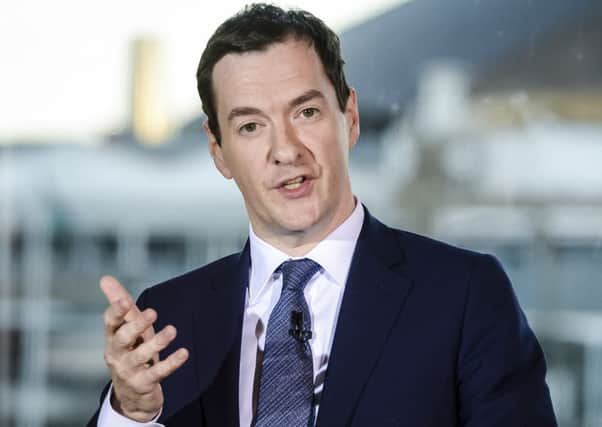'˜Tax rises or spending cuts' to meet George Osborne's budget


With a surplus of £10 billion – or 0.5 per cent of national income – forecast for the last year of this Parliament, Mr Osborne has very little margin for manoeuvre and could be knocked off course by bad news on GDP growth, share prices or wages, the Institute for Fiscal Studies (IFS) said.
Even if he makes it to the March 2019 Budget with his plans intact, the chances of Mr Osborne having to hike taxes or slash spending further are greater than one in four, the think-tank warned in its Green Budget report, ahead of the Chancellor’s 16 March Budget.
Advertisement
Hide AdAdvertisement
Hide AdAnd it said that, even if economic figures turn out well, meeting the surplus target will mean increasing fuel duties in line with inflation, taking child benefit away from more high-earning families and allowing the number of wealthy households paying the 45 per cent top rate of income tax to grow further by keeping the threshold frozen at £150,000.
Although the real-terms cuts of 1 per cent in public spending planned by 2019-20 are smaller than some expected, they “won’t be easy” to deliver, the IFS said.
On current plans, public spending in 2019-20 will reach its lowest share of national income for more than 60 years with the exception of 1999-2000 and 2000-01. Spending on public services other than health will be at its lowest level as a fraction of national income since at least 1948-49.
The target announced by Mr Osborne last year of running a surplus “in normal times” is “very inflexible” and radically different from those adopted by previous governments – who achieved surpluses only eight times in the past 60 years – IFS director Paul Johnson said.
He warned that “this could come at a cost”, requiring “big tax rises or spending cuts with very little notice in order to ensure it is met”.
Mr Johnson said: “Mr Osborne’s new fiscal charter is much more constraining than his previous fiscal rules. Uncertainty in the fiscal forecasts means he may well have to cut spending further or raise taxes to get to surplus.
“With public spending reaching historically low levels relative to national income, promises on tax cuts to keep and pay for, and pressure on revenues from a number of taxes, there may be more tough decisions to come.”